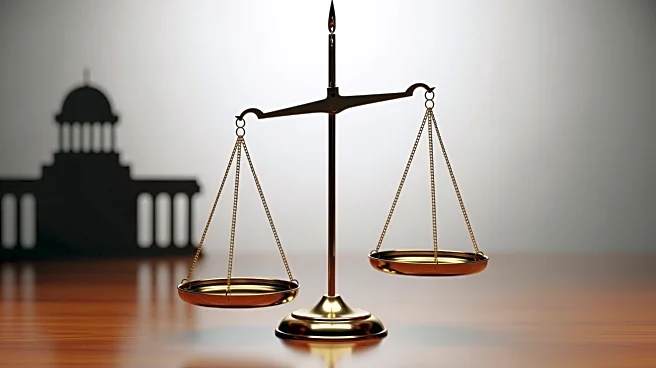What's Happening?
The Supreme Court is set to hear arguments regarding the legality of President Trump's tariffs, which were imposed unilaterally on nearly all goods from almost every country worldwide. The case, Learning
Resources Inc. v. Trump, challenges the president's authority to impose these tariffs without explicit authorization from the law he cited as justification. The federal appeals court previously found these tariffs unauthorized, raising significant questions about presidential power and the balance between the executive and legislative branches. The hearing is expected to last over two hours, with conservative justices facing the challenge of reconciling their deference to presidential authority with statutory interpretation methods.
Why It's Important?
This case holds substantial implications for U.S. trade policy and presidential authority. The tariffs have affected billions of dollars in global trade, impacting industries and economies worldwide. A decision against the tariffs could limit presidential power in trade matters, reinforcing legislative oversight. Conversely, upholding the tariffs might expand executive power, setting a precedent for future unilateral trade actions. Stakeholders in international trade, including businesses and foreign governments, are closely monitoring the case, as its outcome could reshape trade relations and economic strategies.
What's Next?
The Supreme Court's decision will likely influence future trade policies and executive-legislative dynamics. If the court rules against the tariffs, Congress may seek to assert more control over trade decisions, potentially leading to legislative reforms. Businesses affected by the tariffs might pursue compensation or adjust their strategies based on the ruling. Internationally, countries impacted by the tariffs may reassess their trade agreements with the U.S., depending on the court's decision.
Beyond the Headlines
The case highlights broader issues of executive power and judicial interpretation. It underscores the tension between presidential authority and legislative intent, a recurring theme in U.S. governance. The conservative justices' approach to this case may reveal insights into their judicial philosophy, particularly regarding deference to executive actions versus strict statutory interpretation. This could have long-term implications for how similar cases are adjudicated in the future.









